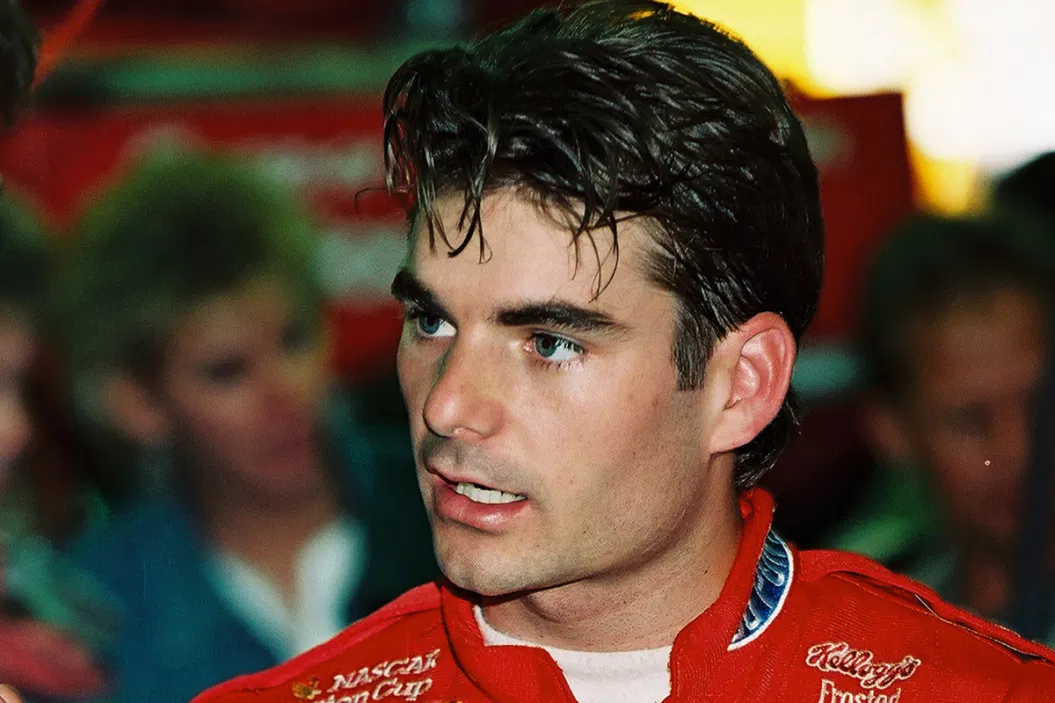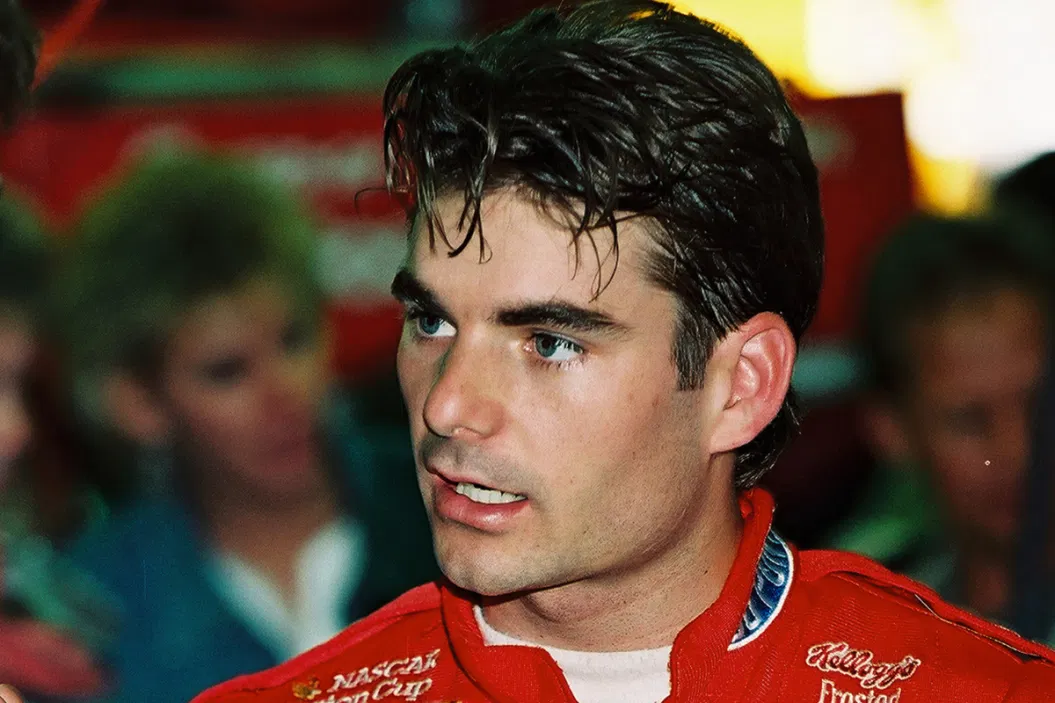
Imago
via Imago

Imago
via Imago

Imago
via Imago

Imago
via Imago
Jeff Gordon’s entry into NASCAR was nothing short of revolutionary. In 1993, at just 21, he secured 7 top-5 finishes, including a 2nd place finish in the Coca-Cola 600, driving the 24 Chevrolet Lumina for Hendrick Motorsports. His dominance on road courses, particularly at Watkins Glen, became legendary. His ability to navigate these challenging tracks with precision and strategy earned him the nickname “Wonder Boy.” But as the sport progressed, new talents emerged, challenging the benchmarks set by legends like him.
Watch What’s Trending Now!
Shane van Gisbergen’s rise in NASCAR was similarly meteoric. In 2025, as a rookie, he clinched five consecutive road course victories, winning everywhere except at COTA. His adaptability and skill on road courses and gradual refinement of oval skills have drawn comparisons to NASCAR legends. And some NASCAR analysts feel that the competition between SVG and Gordon on road courses might outshine the legacy that the latter once created.
SVG eclipsing Jeff Gordon?
In recent discussions among NASCAR analysts Jeff Gluck and Jordan Bianchi in their Teardown podcast, the debate over SVG’s dominance on road courses intensified. “I, Jordan, maintain that he [SVG] still is the GOAT of road course racing. He’s now won five road courses in a row. Jeff Gordon won six, so SVG’s second most in a row. He obviously completely dominated the season. Are you ready to admit, Jordan, that Shane Van Gisbergen is the greatest road course racer ever in NASCAR?” Gluck asked.
Jeff Gordon, a NASCAR Hall of Famer, has been a central figure in this conversation. His record of six consecutive road course wins from 1997 to 2000 set a high benchmark in the sport. While SVG’s recent victory at the Charlotte Roval marked his 5th consecutive road course win, a feat that almost ties with Gordon’s record in a much lesser time. “No, I think he’s certainly on that path, but I don’t think he’s there yet. I still think Jeff Gordon is the best, and if Gordon would have raced in a car that’s basically purpose-built for road courses, because this is almost a sports car in a lot of ways, it would have been interesting to see how he would have done,” Bianchi replied.
He emphasized the importance of consistency and longevity in evaluating a driver’s legacy, suggesting that SVG‘s current success, while remarkable, needs to be sustained over a longer period to be considered the greatest.
“I think he’s very, very good. I think he’s got a chance to be the best when it’s all said and done, but he’s not there yet. We have seen runs from drivers on road courses where they’ve won a bunch of races, and it was like, who’s going to ever beat this guy? It happens. We’ll see,” Bianchi continued, underscoring how Gordon’s legacy in road course racing is well-established.
However, SVG’s rise in NASCAR has been swift and impressive. After making a stunning debut by winning the 2023 Chicago Street Race, he continued his success into the 2025 season, securing multiple road course victories. But Bianchi drew comparisons to his Xfinity Series counterpart, Connor Zilisch, saying, “I’m very fascinated to see what Conor Zilisch does next year, and how he does. Because we sit there and talk about how great Conor Zilisch is on road courses. When SVG goes into the Xfinity Series, Conor Zilisch is right there with them.”

Imago
NASCAR, Motorsport, USA Bank of America ROVAL 400 Oct 5, 2025 Concord, North Carolina, USA NASCAR Cup Series driver Shane van Gisbergen 88 raises the Roval trophy in victory lane at Charlotte Motor Speedway Road Course. Concord Charlotte Motor Speedway Road Course North Carolina USA, EDITORIAL USE ONLY PUBLICATIONxINxGERxSUIxAUTxONLY Copyright: xScottxKinserx 20251005_szo_im2_0131
The 19-year-old phenom is set to make a significant leap into the NASCAR Cup Series full-time in 2026, joining Trackhouse Racing. This move follows a standout season in the Xfinity Series, where he secured 10 wins and clinched the regular-season title, including a dominant victory at the Charlotte Roval, making him a tough competitor to SVG.
But Bianchi felt that Jeff Gordon in his prime would be able to compete with SVG equally and more fiercely if he were given a better car. “So you’re saying, take prime Jeff Gordon, put him in one of the Hendrick cars today, put him in Larson’s car, Byron’s car, whatever. And you think that prime Jeff Gordon, in this race today, could have beat Shane Van Gisbergen?” Gluck enquired.
But when Bianchi said how Gordon’s phenomenal, Gluck agreed but stood firm on his point, saying, “I think Jeff Gordon’s great, but nobody’s better than Shane Van Gisbergen, in a stock car, on a road course… Look at Kyle Larson, one of the best race car drivers in the world, trying to do what he could, and you still can’t beat him. All the people in must-win situations in the playoffs. Reddick is phenomenal. That was before SVG was even in a full-time car. Now it’s with a full regular team.”
“I mean, I think Jeff Gordon’s great. He’s a legend. But to sit here and go, well, SVG would have lost to Jeff Gordon today. After what we just saw? SVG has the three biggest margins of victory on a road course since 1988, all in the same season. Who’s beating this guy? I think it’s naive to think that anybody is,” Gluck concluded.
So, while Bianchi suggests that SVG’s achievements are significant, they should be viewed within the context of the evolving nature of the sport. But Gluck feels that the advancement of racing equipment has an almost negligible role in his success when it comes to his natural skills.
As SVG cements his legacy, NASCAR’s road course future promises a thrilling clash of established dominance and emerging talent. But on the other hand, the same analysts feel that road courses should not be included in the NASCAR playoff schedule.
The debate on road courses in NASCAR playoffs
The 2025 NASCAR Cup Series schedule emphasized road courses, with a total of 5 events. However, when road courses were included in the playoff format, the Bank of America ROVAL 400 at Charlotte Motor Speedway underperformed according to fans and analysts.
Some insiders questioned the need for road courses in the playoffs, as Jeff Gluck noted, “We all agree that there was a long time in NASCAR history where you would have said, ‘three mile-and-a-half tracks in a row? Ugh.. Oh my gosh, let’s get something.’ I personally don’t need any road course in the playoffs…”
Gluck emphasized NASCAR’s core identity as an oval racing series, saying, “NASCAR is the elite pavement oval racing on the planet. IndyCar has some great races for sure, but NASCAR, that is the core brand. Pavement oval racing. It’s amazing. It’s freaking bad–s. So, the more we can see that, especially in playoff time, the better.”
Road courses were historically rare in NASCAR, with Riverside International Raceway hosting intermittent events in the 1960s and 1970s. Their inclusion in the playoff format only gained traction in the 2010s.
With fewer street courses in the 2026 schedule, Gluck sighed in relief: “I think the oval’s bad–s, so I’d love to see that.” On the other hand, Jordan Bianchi reflected on the excitement of traditional oval battles, saying, “Think of how, in the last few laps of the 600, Byron and Chastain were hanging out there. They were fighting their car, trying to set each other up and all this stuff. And then you had the playoff drama and everything else. Like, that is putting yourself in a position to say, ‘this is what we do best. This is who we are.'”
These debates underscore NASCAR’s challenge to balance tradition, excitement, and playoff strategy for fans, and how it continues to shape NASCAR’s landscape.


